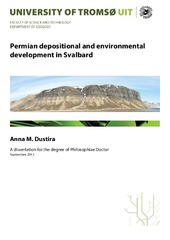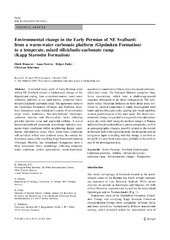| dc.contributor.advisor | Kullerud, Kåre | |
| dc.contributor.author | Dustira, Anna Marie | |
| dc.date.accessioned | 2014-01-22T10:01:35Z | |
| dc.date.available | 2014-01-22T10:01:35Z | |
| dc.date.issued | 2013-10-31 | |
| dc.description.abstract | The main objective of this thesis is to improve the knowledge on the depositional and environmental development of Svalbard during the Permian (299–252 Ma), with a primary focus on the Early to Late Permian Kapp Starostin Formation (Tempelfjorden Group). Thirteen localities of Permian sedimentary strata were investigated with respect to their sedimentological and geochemical properties. Sediments from this period reflect mostly marine deposition on a broad epicontinental shelf at the northern margin of the supercontinent Pangea. Sedimentary facies reveal distinct changes in depositional environment, from marginal/restricted marine settings in a warm and dry climate, to a temperate to cold-water, open-marine shelf. The latter is characterized by cool-water biota including brachiopods, echinoderms, bryozoans and siliceous sponges. These sedimentological shifts are related to a number of controlling factors including changes in palaeolatitude, ocean circulation and upwelling, global climate, and sea level changes. A sequence stratigraphic analysis reveals several orders of relative sea level fluctuations that can be traced within the sediments across the basin, which are likely controlled by a combination of eustasy and local shelf subsidence. By the latest Permian (at the top of the Kapp Starostin Formation), an abrupt loss of biota reflects the End-Permian mass extinction. Geochemical pyrite and stable carbon isotope analyses reveal a gradual onset of marine bottom water oxygen restriction that coincides with the stepwise decrease in biodiversity in the latest Permian. | en |
| dc.description.doctoraltype | ph.d. | en |
| dc.description.popularabstract | Hovedmålet med denne avhandlingen er å øke kunnskapen om avsetningsmiljøet og dets utvikling på Svalbard under permtiden (299-252 Ma), med hovedfokus på den tidlig- til senpermiske Kapp Starostin-formasjonen (Tempelfjord-gruppen). Permiske sedimentære lag ved tretten lokaliteter ble undersøkt med hensyn til sedimentologiske og geokjemiske egenskaper til sedimentene. Sedimenter fra denne perioden gjenspeiler hovedsakelig marin avsetning på en bred kontinentalsokkel på den nordlige randen av superkontinentet Pangea. De sedimentære facies gjenspeiler distinkte endringer i avsetningsmiljøet, fra marginale og avgrensede marine områder i et varmt og tørt klima, til en temperert til kaldtvanns, åpen marin sokkel. Sistnevnte er preget av kaldtvanns biota som omfatter armfotinger, pigghuder, mosdyr og kiselsvamper. Disse sedimentologiske endringene kontrolleres av en rekke faktorer som endringer i breddegrad, havsirkulasjon og ’upwelling’, globalt klima og havnivåendringer. En sekvensstratigrafisk analyse avslører flere nivåer av relative havnivåsvingninger som kan spores i sedimentene over hele bassenget, og som trolig ble styrt av en kombinasjon av eustasi og lokal sokkelinnsynkning. I øverste perm (på toppen av Kapp Starostin-formasjonen), gjenspeiler en brå nedgang av livsformer den senpermiske masseutryddelsen. Geokjemiske analyser av svovelkis og stabile karbonisotoper viser et gradvis minkende oksygeninnhold i det marine bunnvannet som sammenfaller med en trinnvis reduksjon av det biologiske mangfoldet i seneste perm. | en |
| dc.description | Papers 2-5 of the thesis are not available in Munin: <br/>2. Blomeier, D., Dustira, A.M., Forke, H., Scheibner, C.: 'Facies analysis and
depositional environments of a storm-dominated, temperate to cold, mixed siliceous–carbonate
ramp: the Permian Kapp Starostin Formation in NE Svalbard', (manuscipt). <br/>3. Dustira, A.M., Blomeier, D., Collins, D., Goode, T., Groen, R.D.: 'Sequence stratigraphic arrangement and sea-level curve for the Early to Late Permian Kapp Starostin Formation of Svalbard, Norway', (manuscript). <br/>4. Dustira, A.M., Vihtakari, M., Greenacre, M., Blomeier, D.: 'Distinguishing
Permian chert facies from Svalbard, Norway on the basis of geochemical criteria', (manuscript). <br/>5. Dustira, A.M., Wignall, P.B., Joachimski, M., Blomeier, D., Hartkopf-Froder, C., Bond, D.P.G.: 'Gradual onset of anoxia across the Permian-Triassic Boundary in Svalbard, Norway', Palaeogeography, Palaeoclimatology, Palaeoecology (2013), vol.374:303–313. Available at <a href=http://dx.doi.org/10.1016/j.palaeo.2013.02.004>http://dx.doi.org/10.1016/j.palaeo.2013.02.004</a> | en |
| dc.identifier.isbn | 978-82-8236-109-5 (pdf) | |
| dc.identifier.uri | https://hdl.handle.net/10037/5781 | |
| dc.identifier.urn | URN:NBN:no-uit_munin_5491 | |
| dc.language.iso | eng | en |
| dc.publisher | Universitetet i Tromsø | en |
| dc.publisher | University of Tromsø | en |
| dc.rights.accessRights | openAccess | |
| dc.rights.holder | Copyright 2013 The Author(s) | |
| dc.rights.uri | https://creativecommons.org/licenses/by-nc-sa/3.0 | en_US |
| dc.rights | Attribution-NonCommercial-ShareAlike 3.0 Unported (CC BY-NC-SA 3.0) | en_US |
| dc.subject | VDP::Mathematics and natural science: 400::Geosciences: 450::Sedimentology: 456 | en |
| dc.subject | VDP::Matematikk og Naturvitenskap: 400::Geofag: 450::Sedimentologi: 456 | en |
| dc.title | Permian depositional and environmental
development in Svalbard | en |
| dc.type | Doctoral thesis | en |
| dc.type | Doktorgradsavhandling | en |


 English
English norsk
norsk

